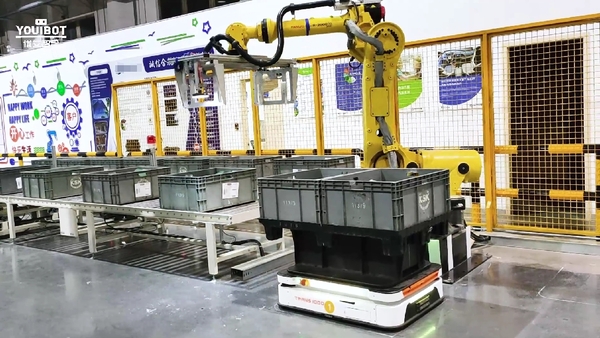© © 2025 Copyright © Youibot Robotics Co., Ltd. All rights reserved.SitemapPrivacy Policy
In the era of Industry 4.0, characterized by interconnectivity, automation, digitization, machine learning, and real-time data, one cannot ignore the role of mobile robots, industrial robots, AMRs (Autonomous Mobile Robots) in the Industrial Internet of Things (IIoT). IIoT serves as the foundational component of Industry 4.0 technologies, seamlessly merging actual production processes and operations with digital technology, AI intelligence, and machine learning. Leveraging vast amounts of data and analytical techniques, IIoT facilitates digital transformation for businesses, constructing more comprehensive and interconnected IoT ecosystems.
Mobile robots are integral to the wave of automation driven by the Industrial Internet of Things (IIoT). These robots play a pivotal role in the IIoT landscape by providing autonomous and mobile capabilities that complement the traditional fixed industrial robots. They are equipped to navigate and perform tasks in dynamic and changing environments, which aligns perfectly with the flexibility demanded by IIoT.
As human demands evolve, mobile robots and AMRs are assigned increasingly complex tasks in various industries, leading to the emergence and widespread adoption of multi-robot collaboration. Let's delve deeper into the concept.

Multi-robot collaboration, as the name suggests, involves multiple robots, including AMRs, working together to accomplish tasks. It emphasizes coordination and cooperation within the entire system. Multi-robot collaborative systems rely on information sharing mechanisms and relative positioning among the robots to enhance system efficiency and task quality. This approach is mainly used for tasks that are subject to time and space constraints, which a single robot cannot complete independently.
Multi-robot collaboration can be categorized into two primary approaches: centralized and distributed. In centralized systems, one robot acts as the central controller, processing all information, gathering data from other robots, and devising strategies for task allocation and resource management. In contrast, distributed systems lack a central controller, with each robot having equal control. They communicate with each other, share information, autonomously process real-time data, and plan their own actions.
Centralized systems are suitable for scenarios with a small number of collaborative robots and relatively simple work environments. In contrast, distributed systems offer greater flexibility, making them ideal for dynamic and constantly changing environments. A well-defined collaborative mechanism is crucial when introducing multiple devices; otherwise, robots might interfere with each other, leading to decreased productivity or even system failure.
As collaborative mobile robots become increasingly intelligent, the focus of the industry has shifted not only toward human-robot collaboration but also robot-to-robot cooperation, making it an integral part of the IoT world.
Many manufacturing industries are undergoing a transformation towards automation, with a particular emphasis on intelligent logistics. Leveraging technologies such as mobile robots, AMRs, and IIoT, businesses are enhancing their responsiveness and product delivery speed. Multi-robot collaboration is a driving force behind efficient production and meeting high-volume manufacturing demands. Moreover, in fiercely competitive markets, cost reduction is a significant focus for the manufacturing industry. Implementing smart logistics can effectively cut expenses, offering greater economic benefits.
Would you like to begin organizing and managing your operations more efficiently with the power of mobile robots and advanced equipment? Explore how Youibot can be your partner in achieving smart automation.
By continuing to use the site you agree to our privacy policy Terms and Conditions.